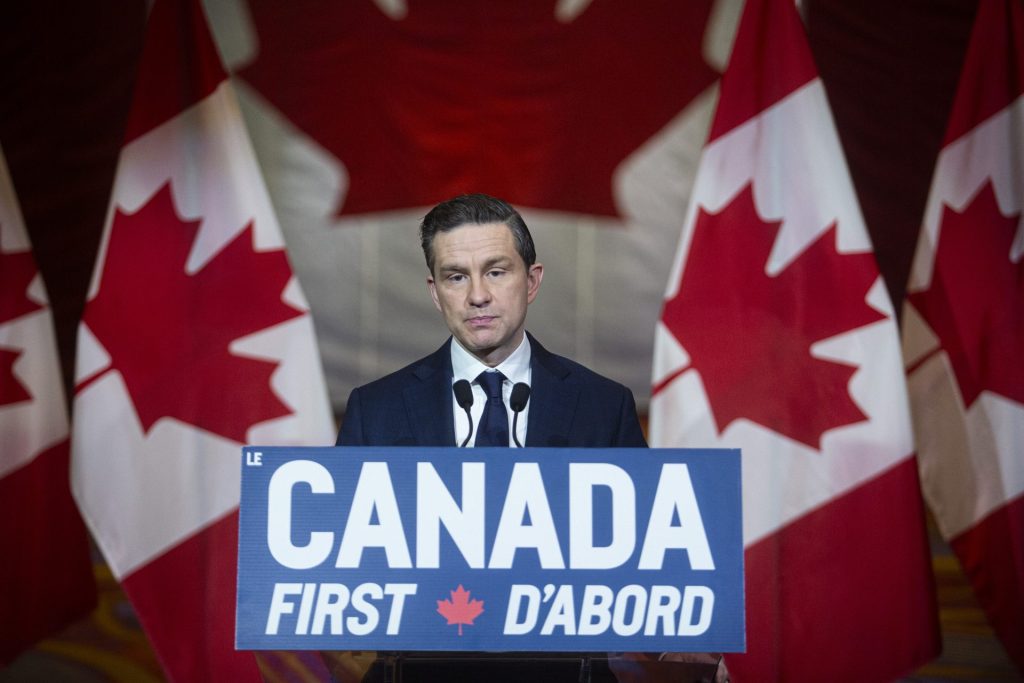Public sector unions raise spectre of Trump, Musk in election campaign against cuts

Several public sector unions are using the chaos and uncertainty unleashed by U.S. President Donald Trump’s mass sackings in the American public service to warn election candidates against cuts to the federal bureaucracy in Canada.
“We cannot see a repeat of DOGE in Canada, even a kinder, gentler Canadian version that still serves the same oligarchs and throws ordinary Canadians under the bus,” said Canadian Association of Professional Employees (CAPE) president Nathan Prier. He was referring to the Department of Government Efficiency, set up by Trump and administered by his billionaire ally Elon Musk, that has caused mass layoffs across the U.S. federal public sector and slashed funding to international development, educational, and other programs.
“Canadians have been very clear that they do not want–in any way, shape or form—a Canadian DOGE.”
On April 9, CAPE, which represents approximately 27,000 members, called for the Public Sector Investment Board (PSP Investments)—which manages retirement savings for federal public servants—to divest from all holdings in Musk’s electric auto company Tesla.
CAPE said the board should divest from the company due to the role of its CEO as U.S. Trump’s single-largest political donor and his role within the administration, which has threatened Canada’s economy via tariffs and sovereignty through threats of annexation since January.
Speaking outside an Ottawa Tesla dealership with about a dozen CAPE members on April 9, CAPE president Nathan Prier said the union’s demand was also in solidarity with American public servants subject to mass layoffs and uncertainty as a result of DOGE.
“The Canadian government’s already going at Tesla, they’re cutting Tesla out of the EV rebate program, so this isn’t a new thing,” he said. “We’re just asking the Investment Board of one of the biggest pension funds in the country to take the next step. But this is a conversation that we want to explore more with our union siblings across the country and in the U.S., to look at ways that we can de-finance this attack on workers’ rights and workers’ livelihoods.”

Prier said CAPE’s letter was intended as a model for other unions across the country, especially for those that have some say over their members’ pension funds. He noted that public sector unions had a voice on the advisory committee of PSP Investments, but not a vote.
When asked by The Hill Times whether CAPE was asking for pension funds to divest from companies owned by other Trump allies, Prier said Tesla was the “most obvious symbol” to target.
“We should absolutely look into what’s financing our enemy right now in this trade war, in the deepest way possible,” he said. “Obviously, that takes some time to untangle with index funds, mutual funds, so Tesla is the most obvious example.”
According to the most recent quarterly report filed with the U.S. Securities and Exchange Commission on Feb. 14, the Public Sector Pension Investment Board owned 690,063 shares in Tesla as of Dec. 31, 2024, worth US$278.7-million ($395.1-million) at the time. Since then, Tesla stocks have plummeted, meaning PSP Investments’ position with the shares would have dropped to US$159.9-million ($226.70-million) as of April 9.
Trump’s cuts to the United States’ federal public service have featured heavily in election-related material from Canada’s public sector unions, which have warned against replicating the process in this country.
So far during the campaign, the Liberals have promised a cap on the size of the public service and attempt to improve government efficiency via artificial intelligence and machine learning.
The Conservatives, meanwhile, have promised cuts to the federal public service—suggesting it could be achieved through natural attrition—and have hinted at providing clearer assignments and monitoring of public servants.
On April 4, the Public Service Alliance of Canada (PSAC)—which represents approximately 240,000 members—warned in a press release that Trump’s March 27 executive order to end collective bargaining with some federal labour unions was “a warning sign for all of us in Canada.”
“We have seen what happens when governments attack unions: workers lose their rights, wages stagnate, and public services suffer,” the press release said. “The right-wing propaganda machine has convinced millions of Americans to vote against their own best interests, and we can’t let that happen here. Trump’s actions set a dangerous precedent that could fuel similar anti-worker policies in Canada.”
The press release built on the “For You, Canada” campaign PSAC launched prior to the election, which urges Canadians to “vote to protect public services” and warns that “reckless cuts and political maneuvering put these services and our country at risk.”
“Public service workers keep Canada running. From safeguarding borders, ensuring food and water safety, assisting farmers, delivering social programs, and responding to emergencies like wildfires, this work is essential in maintaining services that work for you, Canada,” the campaign’s website states.
According to the Meta Ad Library, PSAC was running 75 ads related to the “For You, Canada” campaign across Facebook and Instagram as of April 9. Some of those ads focused on specific public servants and the services provided to Canadians. Others targeted Conservative Leader Pierre Poilievre, accusing his policy platform of weakening the country through cuts.

“Pierre Poilievre’s plan for Canada could weaken border security, delay emergency responses, and reduce the resources that keep people in Canada safe,” one ad states. “Don’t fall for the trap—Canada’s safety depends on public service workers.”
The Professional Institute of the Public Service of Canada (PIPSC)—which represents approximately 70,000 members—sent questions to the Liberals, Conservatives, New Democrats, Bloc Québécois, and Green Party about where they stood “on the issues important to our members.”
The union asked for the party’s commitment to 17 areas, including the protection of public service jobs and use of evidence-based program reviews, rather than mass layoffs; fair compensation for those affected by the Phoenix pay system; ending outsourcing of government services; and focusing on “human-centric AI policies that augment rather than replace workers.”
PIPSC will also join CAPE at a rally planned for April 23 at Tunney’s Pasture, which will call for the federal government to sell excess federal office space to convert into housing. Further efficiencies could be found through permitting more remote work and work-from home policies for the public service, Prier said during the April 9 press conference.
“Remote work might seem detached from this, but it’s not. If we’re serious about finding government efficiencies right now, the last thing we should be doing is cutting public sector jobs,” he said.
“The first thing we should be doing is granting remote work rights to public servants that can work remotely so we can start downsizing our real estate footprint, get billions of dollars of office expenses out of the federal budget, and convert those to much needed housing.”
sjeffery@hilltimes.com
The Hill Times





 LICENSING
LICENSING PODCAST
PODCAST ALERTS
ALERTS













